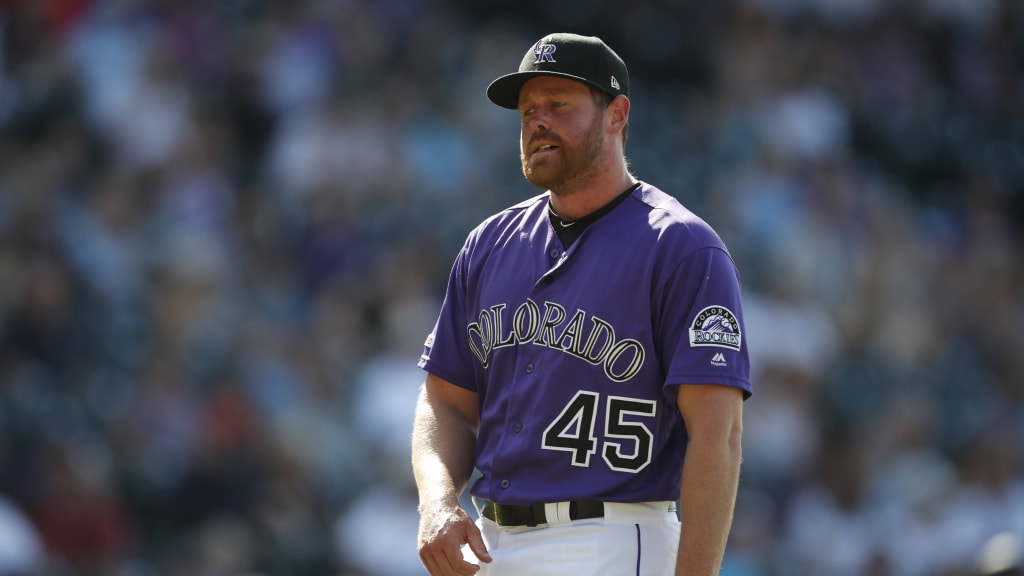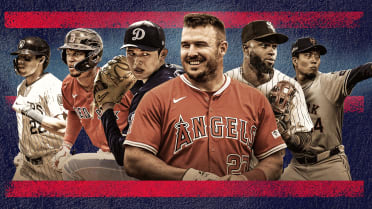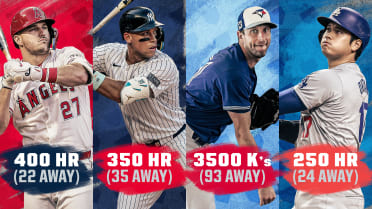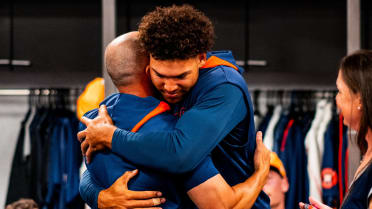
PHOENIX -- Scott Oberg’s current chapter is full of possibilities.
Oberg is not able to pitch out of the Rockies’ bullpen because, this spring, he went through his fourth occurrence since 2016 with blood clots in his right arm, but he’s an integral part of the club.
He counsels pitchers, especially the younger relievers that populate the bullpen. He’s delved far enough into statistical analysis to know he "can certainly go down some rabbit holes in that department.” He scouted a Denver-area high school prospect, and on Wednesday he worked with interim general manager Bill Schmidt and scouts at the team’s facility in Scottsdale, Ariz., in preparation for Sunday’s MLB Draft. He also is the Rockies’ MLB Players Association representative.
Still, he feels the call of his favorite job. He was one of the Majors' most effective relievers in 2018 and '19. Dressed in pregame workout gear and wearing his glove before Tuesday’s game against the D-backs at Chase Field, his thoughts drift when he is playing catch with one of the active players.
“It’s like, ‘OK. Yeah. The slider feels good right now. Maybe I’ll rip one of those off,’” Oberg said, smiling and reaching out with a familiar wrist flick.
But really Oberg is realistic. He is happy the news from doctors is good, in the most important ways.
“In my day-to-day life, you know, they seem pretty confident that that'll be fine, that something like this won't happen moving forward,” he said. “I’m still holding out hope I’ll be able to come back and play. It’s just that they really don’t have those answers.”
But Oberg, 30, is forging opportunity by dabbling in as many possible post-career pursuits as possible, with a team that not only wants him but can use the help.
The Rockies have dealt with resignations in the front office, most notably general manager Jeff Bridich, and they had research and development personnel plucked by private industry during the pandemic. Oberg has interest in how off-field employees bring valuable insight, and he is gaining perspective on transferring ideas to players.
To add to his knowledge base, Oberg will begin online classes in late August in pursuit of a master’s degree in sports management at Georgetown University. He holds a history degree from the University of Connecticut.
“If I can’t play at the current moment, at least I’m doing something active within the realm of the game, keeping my mind active, trying to solve some problems for guys, trying to see something they might not be able to see or see it from a different lens,” Oberg said.
Manager Bud Black, whose post-playing career began in 1995 when Cleveland released him as a pitcher but made him a special advisor, said he still sees Oberg as a player, because that’s the way Oberg sees himself. But Black is impressed that Oberg “adds value in a lot of different ways, and I, along with our coaching staff, encourage Scott to intermingle and give his thoughts -- because I trust Scott.”
Right-hander Yency Almonte has felt Oberg’s impact already.
What nearly was a scoreless 10th inning against the Cardinals last Friday devolved into a six-run mess on Almonte. A mislocated 0-2, two-out pitch to Yadier Molina started the unraveling.
Almonte was in the training room when he heard Oberg’s familiar voice.
“He said, ‘Hey, come find me,’” Almonte said. “When I first got called up, if Adam Ottavino, Chad Bettis, Tyler Chatwood or even Oberg, himself, called me like that, I need to be there.
“He called me into the video room, and the first thing to do was show me that same clip that happened to him in 2018 against San Diego. It was funny. Same situation -- runner on, two out, he went to throw a fastball up and he missed basically middle.”
Oberg was sent down to Triple-A Albuquerque in 2018 and didn’t know if he’d make it back. He ended up earning the save in the 2-1, 13-inning Wild Card Game victory over the Cubs. It was more encouragement than coaching points for Almonte, whose following appearance was scoreless.
“It was like, ‘Hey, I’ve been there, I know what it’s like,’” Oberg sad. “’You're right on the cusp. Like, you know, you're doing really good things.’”
The melding of his on-field education with all he’s learning off it is fascinating for Oberg, who hasn’t made post-career decisions -- since he isn’t there yet.
“It's just seeing a completely different side of it,” Oberg said. “Sometimes you get tunnel vision when you’re playing. You only want certain information. I’m trying to see the broader, bigger picture.”
Senior Reporter Thomas Harding has covered the Rockies since 2000, and for MLB.com since 2002.




